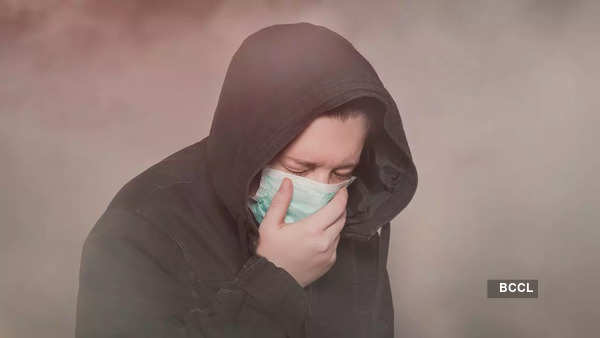Health consequences of elevated AQI levels:
1. Respiratory issues: Increased AQI levels can result in respiratory problems such as asthma, bronchitis, and heightened symptoms in individuals with pre-existing respiratory conditions. It can also induce coughing, wheezing, and breathlessness in otherwise healthy individuals.
2. Cardiovascular complications: Air pollution, including particulate matter found in high AQI levels, may contribute to heart attacks, strokes, and other cardiovascular diseases. Prolonged exposure to polluted air elevates the risk of these conditions.
3. Allergies: Poor air quality can intensify allergic reactions, manifesting as sneezing, a runny or itchy nose, and itchy or watery eyes. Airborne pollutants can trigger allergic responses in susceptible individuals.

4. Exacerbation of existing health conditions: Individuals with pre-existing health issues like diabetes, lung diseases, or heart problems may experience worsened symptoms when exposed to high levels of air pollution. Air pollutants can further strain their already compromised systems.
5. Diminished lung function: Persistent exposure to elevated air pollution levels can lead to a decline in lung function, particularly in children and older adults. This reduction in lung function can persist over time, affecting overall quality of life.
6. Developmental challenges in children: Children exposed to air pollutants, especially during critical developmental stages, may face issues related to lung growth, cognitive development, and overall health. Poor air quality can impede children’s ability to learn and contribute to long-term health problems.
7. Exacerbation of COVID-19 symptoms: Studies suggest that individuals residing in areas with high air pollution levels may be more susceptible to severe complications if they contract respiratory infections like COVID-19. Poor air quality can compromise the respiratory system, making it more challenging for the body to combat infections.
8. Mental health impacts: Some research indicates a potential connection between air pollution and mental health issues, including depression and anxiety. Prolonged exposure to polluted air may have adverse effects on mental well-being.
It is crucial for individuals, especially those in areas with frequently high AQI levels, to take necessary precautions such as staying indoors on days with poor air quality, using air purifiers, and wearing masks to minimize exposure. Additionally, governments and communities need to collaborate to reduce air pollution and safeguard public health.

Indoor safety measures:
1. Limit outdoor exposure: On days with poor air quality, especially during high AQI levels, minimize outdoor activities and stay indoors as much as possible.
2. Air purifiers: Invest in air purifiers to reduce indoor pollutant levels, creating a cleaner and safer environment for respiratory health.
3. Ventilation: Ensure proper ventilation in living spaces to enhance the circulation of fresh air and minimize indoor pollutants.
Outdoor safety measures:
1. Protective masks: Use masks designed to filter out pollutants, especially when engaging in outdoor activities in areas with high air pollution levels.
2. Activity timing: Plan outdoor activities during times when air quality is better, typically in the early morning or late evening.
3. Stay informed: Regularly check local air quality forecasts to plan outdoor activities accordingly.
What is the connection between COPD and cardiovascular health?
Adopting an eco-friendly lifestyle:
1. Sustainable transportation: Utilize public transportation, car-pooling, or embrace eco-friendly vehicles to reduce individual carbon footprints.
2. Sustainable energy: Advocate for and adopt sustainable energy sources, such as solar and wind power, to decrease reliance on fossil fuels.
3. Green spaces: Contribute to the establishment and maintenance of green spaces within communities, as plants play a pivotal role in air purification.
Personal health and well-being:
1. Regular exercise: Engage in regular exercise to enhance overall respiratory health and lung function, aiding the body in coping with exposure to air pollutants.
2. Healthy diet: Consume a well-balanced diet rich in antioxidants, vitamins, and minerals to help mitigate the impact of air pollution on the body.
3. Hydration: Stay adequately hydrated to support the body’s natural detoxification processes.
Addressing the hazards associated with declining air quality requires a comprehensive approach. Communities, governments, and individuals must collectively adopt protective measures and lifestyle adjustments to enhance public health and the quality of the air. Implementing these practices can contribute to providing future generations with a better and more sustainable future.

